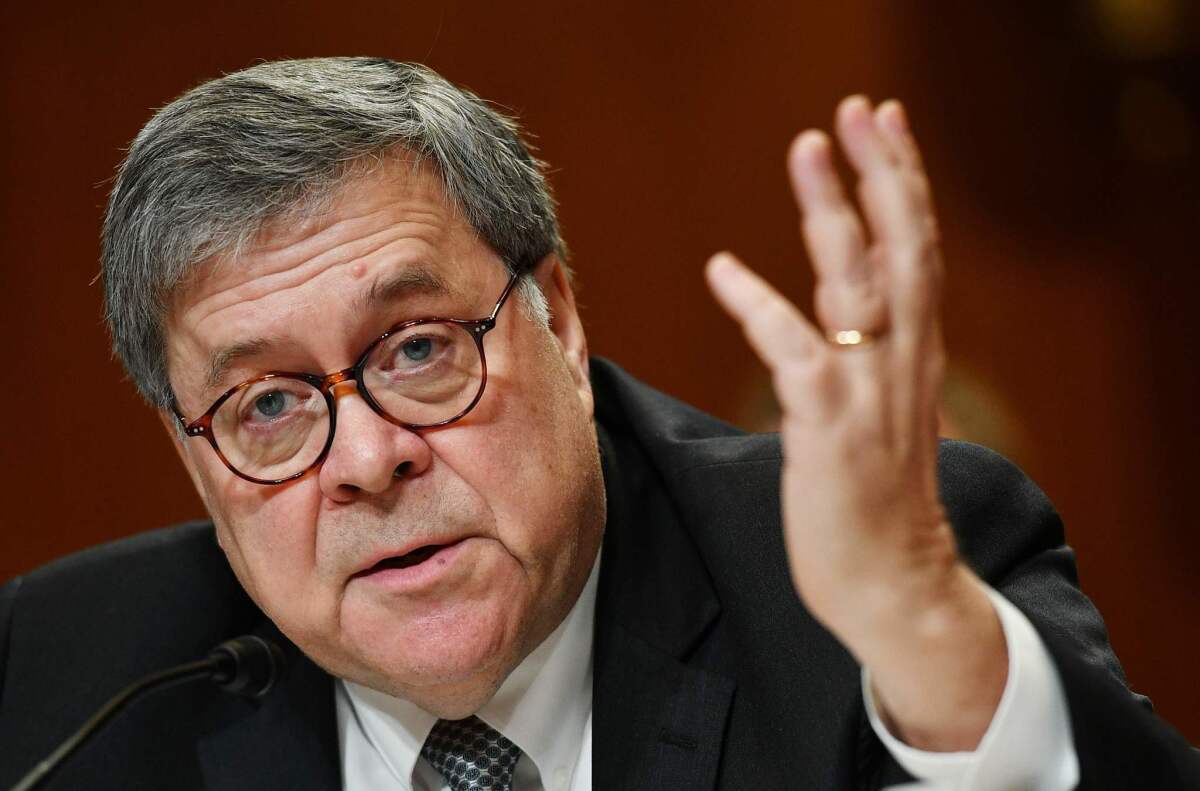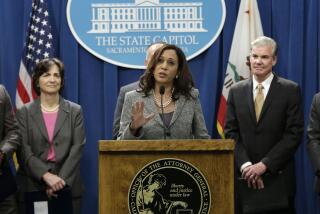Op-Ed: William Barr isn’t a toady. That’s the nature of his job

Many have been all too quick to make Atty. Gen. William Barr out to be a reflexive toady for President Trump. Just last week, the New York City Bar Association took the extreme step of writing to congressional leaders to investigate Barr for political bias. And last month, he came under blistering criticism for defending the Trump campaign and characterizing the FBI’s Russia investigation into the 2016 election as bogus.
Slate has accused Barr of using the Department of Justice as “a personal law firm for Trump.” Vox has bewailed “the department’s politicization under Barr.” The Daily Beast has lamented how Barr has “become another of Donald Trump’s personal lawyers.” The New York Times has noted that the attorney general had “reprised his role as a vocal defender of President Trump.”
Perhaps none of these media outlets recall the time when then-Atty. Gen. Eric Holder famously described himself as President Obama’s “wingman.” Curiously, Holder actually took to the Washington Post to decry Barr’s ostensible self-debasement as an unfortunate “instrument of politics.”
Holder’s hypocrisy aside, the newfound stance in favor of a strongly independent attorney general among liberals is misguided as a matter of constitutional interpretation and ahistorical as a matter of American custom.
Article II, Section 1, Clause 1 of the Constitution states that “[t]he executive Power shall be vested in a President of the United States of America.” The power is vested not in numerous sources, but solely in the president. The president maintains plenary authority over the entirety of the executive branch.
The “unitary executive theory,” which Democrats routinely excoriate, comes from the plain text of the Constitution. As Atty. Gen. Barr recently said during his remarks at the Federalist Society’s 2019 National Lawyers Convention, the notion of the unitary executive “is not ‘new,’ and it is not a ‘theory.’” On the contrary, he continued, “[i]t is a description of what the Framers unquestionably did in Article II of the Constitution.”
Throughout American history, attorneys general have intuited and acted upon their non-independent subordination to presidents of the United States. In “Conflicting Loyalties: Law and Politics in the Attorney General’s Office, 1789–1990,” the scholar Nancy V. Baker explored the historical nature of the attorney general’s position. Baker devoted entire book sections to “The Attorney General as a Legal Adviser” and “The Attorney General as a Policy Advisor.” She observed that “before he became an administrator” of a sprawling Department of Justice bureaucracy, “the attorney general assumed the role of the advisor to the president.” What’s more, the attorney general’s “responsibility” to serve in such an advisory capacity “has antecedents in seventeenth-century England.”
Indeed, the role of the attorney general as a top presidential advisor has been a recurring theme throughout American history. When President Lincoln’s attorney general, Edward Bates, famously wrote to Congress in 1861 to defend Lincoln’s unilateral suspension of the writ of habeas corpus, he did so not as a neutral arbiter of legal principle, but as Lincoln’s top legal advisor who shared his superior’s ultimate policy aim of a Union victory in the Civil War.
Similarly, President Franklin Roosevelt’s wartime attorney general, Francis Biddle, ceased his vocal opposition to Japanese American internment after it became obvious that Roosevelt planned to sign the fateful Executive Order 9066. Biddle understood that he was not in any way independent of the president, but that he was a political appointee who had to support the president in order to keep his job.
In modern times, the Justice Department’s Office of Legal Counsel, which was created by Congress during the New Deal, provides “legal advice to the president and all executive branch agencies” and reviews “all executive orders and substantive proclamations proposed to be issued by the president.” The president also has at his disposal the White House counsel’s office, but that office tends to focus on legal issues arising from legislation, executive branch and judicial branch nominations and ethics questions.
Though the Office of Legal Counsel does sometimes reach legal conclusions at loggerheads with the White House, it is hardly independent in any meaningful way. Former Acting Assistant Atty. Gen. David Barron, who led the OLC during the early years of the Obama administration, once stated that the office’s legal analyses “may appropriately reflect the fact that its responsibilities also include facilitating the work of the Executive Branch and the objectives of the President, consistent with the law.” And legal scholarship has observed the “systematic deference” that the Office of Legal Counsel generally shows toward the president’s prerogatives.
Eric Holder was correct the first time. The attorney general, in large part, actually is the president’s “wingman.”
Josh Hammer is editor at large of The Daily Wire and of counsel at First Liberty Institute.
More to Read
A cure for the common opinion
Get thought-provoking perspectives with our weekly newsletter.
You may occasionally receive promotional content from the Los Angeles Times.










